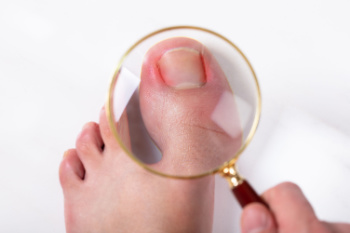
An ingrown toenail is more than a nuisance. It can quickly become a painful and persistent problem. When the nail’s edge presses into the skin, irritation follows. If ignored, this small issue can develop into an infection that impacts your ability to walk comfortably. Many factors contribute to ingrown toenails, including trimming nails too short, wearing shoes that squeeze the toes, and sustaining toe injuries. Some individuals are simply more prone to this condition due to the natural shape of their nails. Prevention often begins with simple habits, such as cutting toenails straight across and avoiding overly tight footwear. However, once an ingrown nail becomes inflamed or infected, professional care is the best option. If you are experiencing persistent toe pain or signs of infection, it is recommended that you see a podiatrist for a thorough evaluation and appropriate treatment.
Ingrown toenails can become painful if they are not treated properly. For more information about ingrown toenails, contact the podiatrists of New England Family Foot Care. Our doctors can provide the care you need to keep you pain-free and on your feet.
Ingrown Toenails
Ingrown toenails occur when a toenail grows sideways into the bed of the nail, causing pain, swelling, and possibly infection.
Causes
- Bacterial infections
- Improper nail cutting such as cutting it too short or not straight across
- Trauma to the toe, such as stubbing, which causes the nail to grow back irregularly
- Ill-fitting shoes that bunch the toes too close together
- Genetic predisposition
Prevention
Because ingrown toenails are not something found outside of shoe-wearing cultures, going barefoot as often as possible will decrease the likeliness of developing ingrown toenails. Wearing proper fitting shoes and using proper cutting techniques will also help decrease your risk of developing ingrown toenails.
Treatment
Ingrown toenails are a very treatable foot condition. In minor cases, soaking the affected area in salt or antibacterial soaps will not only help with the ingrown nail itself, but also help prevent any infections from occurring. In more severe cases, surgery is an option. In either case, speaking to your podiatrist about this condition will help you get a better understanding of specific treatment options that are right for you.
If you have any questions please feel free to contact our office located in Milton, MA . We offer the newest diagnostic and treatment technologies for all your foot and ankle needs.

Foot exercises play an essential role in maintaining mobility, strength, and flexibility. Strong and flexible feet improve shock absorption, reducing the impact on joints during activities such as walking and running. Proper weight distribution is also supported by well-conditioned feet, helping to prevent imbalances that can lead to discomfort or injury. Engaging in targeted exercises activates key muscles in the feet, promoting stability and endurance. Stretching and strengthening routines enhance movement efficiency and reduce the risk of conditions like plantar fasciitis and arch pain. Additionally, regular foot exercises can improve overall posture and balance, making daily activities and athletic performance more effective. If your feet are unstable and have become painful, it is suggested that you visit a podiatrist who can treat various foot conditions, and guide you on specific foot exercises for strength and flexibility.
Exercising your feet regularly with the proper foot wear is a great way to prevent injuries and build strength. If you have any concerns about your feet, contact the podiatrists from New England Family Foot Care. Our doctors can provide the care you need to keep you pain-free and on your feet.
Exercise for Your Feet
Exercise for your feet can help you gain strength, mobility and flexibility in your feet. They say that strengthening your feet can be just as rewarding as strengthening another part of the body. Your feet are very important, and we often forget about them in our daily tasks. But it is because of our feet that are we able to get going and do what we need to. For those of us fortunate enough to not have any foot problems, it is an important gesture to take care of them to ensure good health in the long run.
Some foot health exercises can include ankle pumps, tip-toeing, toe rises, lifting off the floor doing reps and sets, and flexing the toes. It is best to speak with Our doctors to determine an appropriate regimen for your needs. Everyone’s needs and bodies are different, and the activities required to maintain strength in the feet vary from individual to individual.
Once you get into a routine of doing regular exercise, you may notice a difference in your feet and how strong they may become.
If you have any questions please feel free to contact our office located in Milton, MA . We offer the newest diagnostic and treatment technologies for all your foot and ankle needs.

Diabetes can cause serious problems for your feet if not managed well. High blood sugar levels can damage the nerves in your feet, leading to numbness, tingling, or loss of feeling, which is called diabetic neuropathy. When you cannot feel pain, you might not notice cuts, blisters, or sores. Diabetes can also slow down blood flow, making it harder for wounds to heal and increasing the risk of infection. If infections are not treated quickly, they can lead to serious complications, including loss of limbs. Daily foot care is important for people with diabetes. Check your feet every day for cuts, redness, or swelling, and wear shoes that protect your feet. If you have diabetes, it is suggested that you see a podiatrist regularly for help in addressing problems early and keeping your feet healthy.
Diabetic foot care is important in preventing foot ailments such as ulcers. If you are suffering from diabetes or have any other concerns about your feet, contact the podiatrists from New England Family Foot Care. Our doctors can provide the care you need to keep you pain-free and on your feet.
Diabetic Foot Care
Diabetes affects millions of people every year. The condition can damage blood vessels in many parts of the body, especially the feet. Because of this, taking care of your feet is essential if you have diabetes, and having a podiatrist help monitor your foot health is highly recommended.
The Importance of Caring for Your Feet
- Routinely inspect your feet for bruises or sores.
- Wear socks that fit your feet comfortably.
- Wear comfortable shoes that provide adequate support.
Patients with diabetes should have their doctor monitor their blood levels, as blood sugar levels play such a huge role in diabetic care. Monitoring these levels on a regular basis is highly advised.
It is always best to inform your healthcare professional of any concerns you may have regarding your feet, especially for diabetic patients. Early treatment and routine foot examinations are keys to maintaining proper health, especially because severe complications can arise if proper treatment is not applied.
If you have any questions please feel free to contact our office located in Milton, MA . We offer the newest diagnostic and treatment technologies for all your foot and ankle needs.





